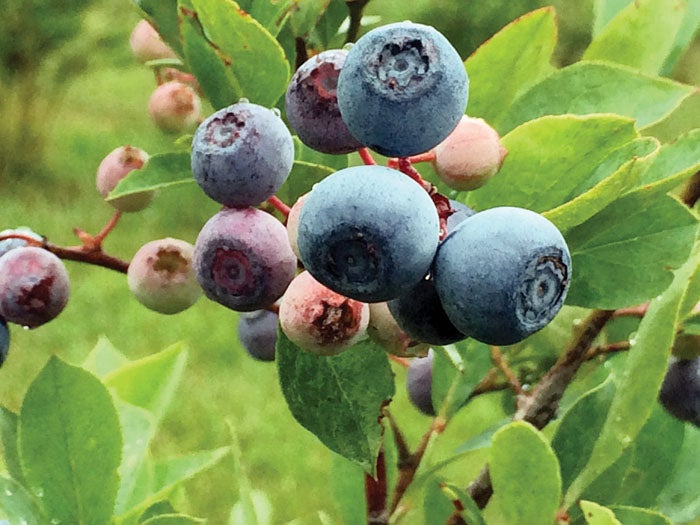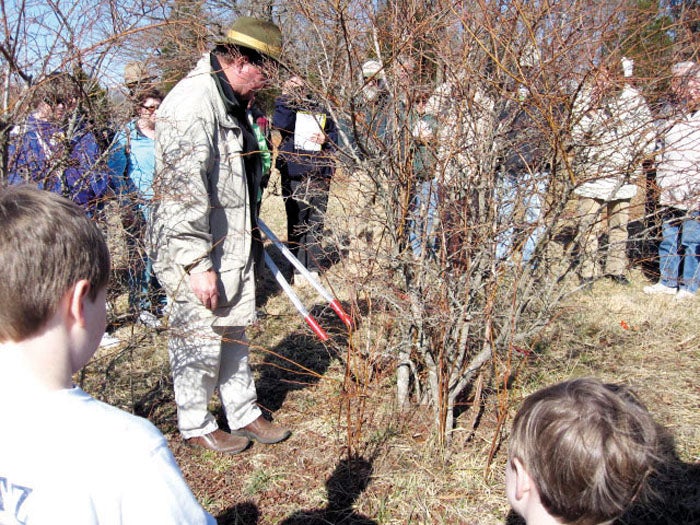Amy-Lynn Albertson column: Edible landscapes start with blueberries
Published 12:00 am Sunday, February 14, 2021

- Blueberries are for sale at the Rowan County Extension Plant Sale. Plants are $10 for a one-gallon pot.
By Amy-Lynn Albertson
North Carolina Cooperative Extension
Blueberries can be grown in home gardens anywhere in North Carolina if the right species and proper soil modifications are used. Blueberries are typically used in the landscape as hedges for screening purposes, but they can also be used in cluster plantings or single specimen plants. Blueberries are an ideal year-round addition to the landscape. They have delicate white or pink flowers in the spring, the summer fruit has an attractive sky-blue color, and the fall foliage adds great red and yellow colors to the landscape. Also, blueberry plants lend themselves to the “organic” approach of gardening because pesticides are rarely needed in home garden plantings. The rabbiteye blueberry is native to Georgia and grows quite well here in North Carolina. The other species of blueberries include the Highbush and Southern Highbush blueberries. These blueberries will also grow in the piedmont, but the Rabbiteye is more drought and heat resistant and will tolerate a more comprehensive range of soil types than the highbush. Blueberries require acid soil with a pH range of 4.6 – 5.1. Take a soil test before planting blueberries to find out your existing soil pH and how much you may need to adjust it. You will need to add wettable sulfur if your soil pH is higher than 5.3, and it will need to be applied two to three months before planting.
Blueberry plants require excellent soil drainage, so find out how well your soil drains before planting. Soil maps or observing the soil profile may help predict drainage. Alternatively, digging a “dry-well” can be a very effective means of determining soil drainage. Dig a hole(s) 6 to 8 inches deep and observe the water level following heavy rains. Water should not remain in the hole for more than 24 hours; otherwise, select another site or plant on ridges high enough for the water level to reach 6 to 8 inches deep within 24 hours. Blueberries perform better in full sun; however, they will tolerate up to 50% shade.
Under shady conditions, the yield will be decreased. Rabbiteye blueberries require cross-pollination to set fruit. Therefore when selecting your blueberry plants, make sure you choose two different varieties of rabbiteye blueberries. Recommended varieties include Tifblue, Climax, Premier, Powder Blue and Centurian. Plants that are 2 to 3-year-old nursery plants and 12 to 36 inches tall will transplant the best. Potted blueberries are best transplanted in the fall, while bare-root blueberries should be planted in late winter as soon as the ground can be worked up. After planting, prune back the top two thirds of plant growth and don’t allow the plant to flower its first year after planting.
Blueberries are easily damaged by too much fertilizer, so use caution and follow your soil test recommendations.
Organic mulches like pine bark, aged sawdust, and pinewood chips help maintain a uniform soil temperature and retain soil moisture. With good care, a rabbiteye blueberry bush should yield 10 pounds of fruit and, on occasion, as much as 25 pounds. Birds love blueberries as much as people, so be prepared to share some fruit with our feathered friends. Plastic or cloth netting thrown over the bushes will help decrease the amount of damage caused by the birds. Blueberries on the coast will start ripening around the end of May and on through June.
In the Piedmont, we can expect our blueberries to start ripening in mid June through July, depending on the variety of blueberries you have planted. Rowan County Cooperative Extension is having its annual Spring Plant Sale this year; we have bunch grapes, blueberries, blackberries, muscadine grapes, fig trees, pomegranates and assorted fruit trees. Due to COVID-19 and limited stock, all orders must be taken by phone Monday through Friday 8 a..m-5 p.m. until Feb. 26. To order or for more information, call 704-216-8970 or go to www.rowan.ces.ncsu.edu.
Amy-Lynn Albertson is the Rowan County Extension director.





